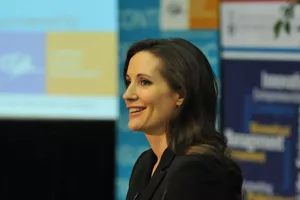
Amanda Lang talks innovation, curiosity and change at Countdown to Success
“Curiosity killed the cat” is probably not Amanda Lang’s favourite expression.
According to the senior business correspondent for CBC’s The National, asking questions—the right kinds of questions, and lots of them—is what’s needed to make Canada’s economy more productive.
“You have to create an environment that allows for “why?” and “why not?” said Lang last Friday evening at the University of Toronto Mississauga’s Countdown to Success event, recalling what a Cisco Canada leader had told her about fostering an innovative business culture.
That was a central part of Lang’s message during her keynote address at the event, which was organized by UTM’s Department of Management and took place in the Recreation, Athletics and Wellness Centre. The veteran business reporter co-hosts the CBC TV show The Lang & O’Leary Exchange, which covers the day’s major business stories, and previously worked as a reporter at The Globe and Mail and the National Post, and as an anchor and reporter for CNN and Business News Network. Last year, she published her first book, The Power of Why, which reveals how curiosity can drive change in business and in our personal lives. Addressing a crowd of UTM students, graduates and faculty, and members of the general public, Lang spoke frankly and insightfully about innovation, curiosity and change, focusing on the key factors contributing to Canada’s innovation stagnation, and how we can all improve productivity in the country.
During her talk, Lang discussed the various ways our curiosity is stifled as we grow up. She cited research showing that parents often brush off their young children’s relentless questions, which teaches them that curiosity is a bad thing. As we go through school, we encounter teachers who prefer obedient to curious students, and become accustomed to studying what will be on tests, rather than what really interests us. In the workforce, most employers give innovation lip service, but aren’t really interested in their employees’ ideas. The result, Lang says, are disengaged workers who don’t bring their full passion, creativity and initiative to their jobs.
"Anybody that is in any kind of leadership role has a responsibility to give people permission to be innovative,” Lang said.
The free community event, which was sponsored by Certified General Accountants of Ontario, included a trade show and networking reception designed to expose students and alumni to business opportunities and resources within the accounting, finance and management fields. Among the sponsors were TD Canada Trust, EY, Edward Jones, GE, the Canadian-Chinese Professional Accountants Association, the Financial Planning Standards Council, the Mississauga Business Enterprise Centre, and the Mississauga Board of Trade. The first 100 people to walk through doors received a free copy of Lang’s book.
Professor Ulli Krull, UTM’s Vice-Principal of Special Initiatives, was master of ceremonies, and Mississauga Mayor Hazel McCallion gave a talk about how the city is collaborating with the university, Sheridan College and local post-secondary schools to more effectively produce talented graduates who can meet the needs of local businesses. Then, CGA Ontario CEO Doug Brooks presented the CGA Ontario Alumni Award to Lisa Allen, a 1996 graduate of UTM’s Bachelor of Commerce program and a CGA who currently works at the Canada Revenue Agency and volunteers for CGA Ontario’s Ottawa chapter.
Toward the end of her talk, Lang shared the common traits she discovered among the innovators she interviewed for her book.
“One thing they have in common is how happy they are,” she said. “Also, none of them were overnight successes, but none of them stopped trying. Problems seem different to them. They don’t get upset, they get puzzled.”
She concluded by saying that if we can revive the healthy curiosity we had as toddlers, we would become more innovative, and be more engaged with our lives and our work.
Said Lang: “If everyone lived that way, we would solve the productivity problem, and it would feel good.”
Photography by Stephen Uhraney
